Roz Morris's Blog, page 107
August 31, 2011
How I got my ITIN (US Individual Taxpayer Identification Number)
 If you are outside the US and you want to publish on Smashwords, Amazon Kindle or CreateSpace, your earnings will be taxed unless you have an Individual Taxpayer Identification Number (ITIN). This means that 30% of your money is kept before you ever see it – and then when you get the payment you have to pay your own country's tax rate all over again.
If you are outside the US and you want to publish on Smashwords, Amazon Kindle or CreateSpace, your earnings will be taxed unless you have an Individual Taxpayer Identification Number (ITIN). This means that 30% of your money is kept before you ever see it – and then when you get the payment you have to pay your own country's tax rate all over again.
Not good, huh? But Amazon will pay you gross (without tax) if you provide an ITIN. So an ITIN I would have.
Boy was it difficult. I had three goes. Yes, three – about as many as my driving test. Then I had another two with the form you then have to send Amazon. And I regard myself as pretty good at following instructions, so this seriously annoyed me.
The problem is, the IRS is incredibly pedantic and doesn't tell you half the things you need to know. So to protect your blood pressure and stop you spending unnecessary money, I'm going to tell you how to do it.
Acceptance agents
No. Just don't. If you look on the IRS website they talk about acceptance agents in the UK. Do not touch with a bargepole. I phoned one and they wanted to charge me £500 to handle the application. However, they sounded so ashamed that I persuaded them to tell me the tricky bits I needed to know, like treaty numbers.
Filling in the form
Get a form w-7. You need to know treaty numbers but I've outlined them in red in the picture above. I'm in the UK so this is the treaty number I need, but if you're outside the UK you can find the right number here on the detailed notes for the W-7 form. In the IRS notes it wasn't clear that two boxes had to be ticked in this question, not one.
Support documentation
You need to supply a letter explaining why you need the number, that you've published a book etc etc. (This wasn't clear in the IRS notes when I originally applied, just so you know how helpful they are.)
This was also a royal pain. At first Amazon told me all I needed was to print out their terms and conditions and my listing. That was rubbish.You need a proper letter addressed to you.
Here, Smashwords led the way. You can ask for the letter after you've sold USD$10. Fortunately, Amazon now provide one too. Send this note to CreateSpace Member Services, which you can find on your Createspace dashboard (there is probably a Kindle version of this too, I just chose CreateSpace because they seemed better at replying)
Hi – because I live in the UK I understand you will take US tax off my revenues from selling via Createspace. I want to apply to the IRS for the exemption so that you can pay me gross. I understand I need some documentation from you to support this.
Please could you email me a letter on official Createspace paper which shows:
my member ID number
my name (full name is ;lkjl;kj;lkj, publishing as lkj;lkj;lkj)
a statement that I am publishing through you and that I am a taxpayer in the UK, which is why I need the ITIN
Copying your passport
You need to prove who you are with a notarised copy of your passport, of course. There is only one type of copy the IRS will accept. Not, as they imply on the form, any notarised copy – the kind you can get from the post office or your doctor, even though they are accepted just about everywhere else and you have to pay for them (which is what I wasted money and blood pressure on). You need your passport notarised by an officer of the IRS.
You can find an office of the IRS at the US embassy. If you're near London, visit them in person. I went there with my form and my CreateSpace letter and a charming chap there filled in everything for me, copied my passport and sent it off. Plus we had a lovely conversation about the time he was a spy working undercover in Hungary. He's going to write a novel.
Before you wonder if that's worth the faff let me tell you this – it's FREE.
If you can't get to the embassy in person, phone them. Other people I spoke to on Facebook said they did this and hung on for a while and eventually someone answered. They'll then tell you what to do – though you'll have to trust the postal service with your passport. But honestly, even if you have to try several times before you get through, it's much better than spending £500.
Eight weeks later, I had my ITIN.
The final stage – you're not out of the woods yet
Then I had to send another form to Amazon, a W-8BEN (you can download this from the IRS website) .
Two things to remember:
1 use blue ink
2 do not abbreviate the country name, even though the space for it on the form is tiny. Believe it or not, my first go was rejected because I did this and I had to post another one to the US. The neighbours all heard as I leaped about, spluttering 'do you mean to tell me these people can't tell that UK means United Kingdom? And they have jobs?' But the IRS is looking for reasons to reject. And not following these footling rules will get you rejected.
Find an example of exactly how to fill in W-8BEN here.
Good luck!
Released this week: My Memories of a Future Life, episode 1 The Red Season 'Groundbreaking… expect the unexpected'








August 30, 2011
A year of change in publishing puts writers in the driving seat – guest post at Catherine, Caffeinated
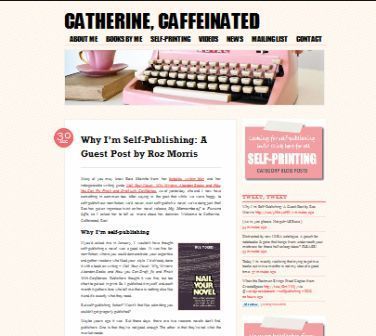 Catherine Ryan Howard was one of the first bloggers I found when I started flinging words into the ether. She was writing about her deep love of caffeine and outer space, and of course her books – among them a memoir.
Catherine Ryan Howard was one of the first bloggers I found when I started flinging words into the ether. She was writing about her deep love of caffeine and outer space, and of course her books – among them a memoir.
That memoir was Mousetrapped: A Year and A Bit in Orlando, Florida – which became a self-publishing phenomenon. Catherine put it out in 2010 after agents and editors told her that while it was a fab read, there was no market for it. Using only free promotional tools like her blog, Twitter and Facebook, Catherine has managed to shift over 7,000 copies. Not only that, she's written a brilliant book on self-publishing, which I keep by my side when I venture into unfamiliar self-publishing waters. When I put Nail Your Novel on Kindle, it was Catherine's blog I used to guide me.
We've both had very positive experiences self-publishing, but we both also swore we would never self-publish our own fiction. But a few months ago I started to think again. And then I happened by Catherine's blog to find she was entertaining the same plan…
She asked me over to her blog to explain what changed my mind and made me publish My Memories of a Future Life (which is out today)… and why, as a bestselling ghostwriter, I even had to self-publish in the first place.








August 29, 2011
'Expect the unexpected…' My Memories of a Future Life in the Kindle store
 'In this intriguing reversal on reincarnation, best-selling ghostwriter Roz Morris turns the tables on all of us who have ever dabbled in past-life regression (and other New Age aspects of metaphysics). Don't expect just another fable of "who I was." Expect a complex, intelligent journey into the heart of Western understanding of reincarnation: what it is, what it could be, what it perhaps is not.
'In this intriguing reversal on reincarnation, best-selling ghostwriter Roz Morris turns the tables on all of us who have ever dabbled in past-life regression (and other New Age aspects of metaphysics). Don't expect just another fable of "who I was." Expect a complex, intelligent journey into the heart of Western understanding of reincarnation: what it is, what it could be, what it perhaps is not.
'Morris is a pleasure to read, an accomplished writer with a clear, polished voice and vivid insight into character and place. Is her novel fantasy? Is it sci-fi? Is it a new, groundbreaking mix of fiction genres? What's the truth behind the story of an injured concert pianist taken further into a dark–even surreal–future than she can handle?
'Expect the unexpected.'
Thank you for the review, Victoria Mixon – writer, fiction editor, and author of The Art & Craft of Fiction.
Episode 1 – The Red Season is now live in the Kindle store. Right here. Episode 2 will follow on Monday September 5th.
I'm having a gosh moment. After eleven novels written in secret for other authors, here's one with my name on it. And a review of its very own. I feel a bit like those songwriters who compose for other people and finally get to claim a song for themselves – a bit scared, and a bit like singing…
Thank you, everyone who has cheered me on. To the lovely people who requested ARCs and emailed me with their progress behind the scenes and to everyone who has told me how much they're looking forward to reading it. Just one more thing – if you like it, would you do me a quick review on Amazon? Reviews make a huge difference if casual browsers pitch up on a page, wondering whether to take a chance.
Now I think I'll get off the podium before I say something ridiculous. If you feel so inclined, you can find episode 1 here.








August 27, 2011
Can you split your novel into four equal parts?
 Structure is the secret to knowing whether your story works. Here's why splitting my novel into episodes has given me a useful new tool
Structure is the secret to knowing whether your story works. Here's why splitting my novel into episodes has given me a useful new tool
The most F of FAQs that I'm being asked at the moment is this: was it easy to split my novel into four parts? Did I originally write it that way?
When I first had the idea of releasing My Memories of a Future Life as episodes I was wondering how on earth it would work. Perhaps it wouldn't go.
But when I divided it according to page numbers I found that, give or take a few, at the end of each quarter was a major shift. The stakes changed, or what the narrator wanted changed. I did some minor tweaking to punch up the episode beginnings but the structure was there already.
I might add that I was rather thankful.
So what?
But if you're not planning to release your novel in episodes, why is this relevant to you?
Because all stories need these major shifts.
On the count of three…
Hollywood talks about the three-act structure for movies. Act 1, the first quarter, is the set-up with the inciting incident. Act 2, the second two quarters, is where the problem is being actively tackled and confronted. Act 3, the last quarter, is the resolution.
Now Hollywood movies have pretty formalised structures, but that's not just because they like formulae. The three-act structure isn't just a matter of convention. It comes from the way the brain naturally looks for change – and the way it likes to see a problem explored.
For the character's journey to feel significant, we have to feel we have gone a long way between start and finish. That's not done by dragging them through a lot of pages. It's not done with the number of characters you whirl in and out, or the number of locations you visit like a James Bond movie. It's done with an internal shift for the character. It's done by altering what the journey means.
The stakes can't be the same at the end of the story as they were at the start. The character must change what they want.
Three acts, four episodes?
Hang on, classic Hollywood structure is three acts. I've got four.
That's because there's also the midpoint.
I refer you to Blake Snyder, of Save The Cat fame. He explains that in his early days of movie-writing, he used to tape movies on C90 cassettes and listen to them in the car. At 45 minutes, where he turned over, he realised the most compelling movies had another crucial change – the midpoint.
The midpoint shifted the whole dynamic of the story. It was the threshold between the beginning and the beginning of the end. It was, to quote the great man, 'the point where the fun and games are over and it's back to the serious story.' (And fortunately I had that too.)
Once you understand what the reader psychologically wants at each point of the story, you can give it a really thorough workout.
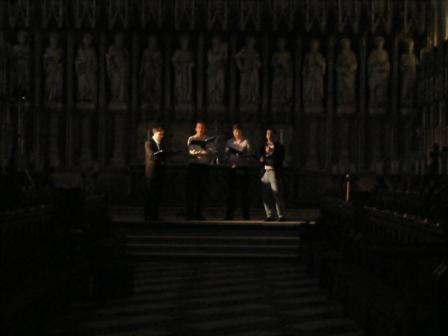 Have you focused your story wrong?
Have you focused your story wrong?
You can even tell if you've misunderstood it. In this post, Darcy Pattison discovered that her second act began far too late, did some soul-searching and realised she was focusing the story wrong. She thought she was writing a quest, but her structure told her her story was actually about the characters maturing. When she revised with this new focus in mind, it helped her create a tighter, more compelling manuscript.
From now on, I'm going to try splitting all my novels into four.
Have you ever analysed your novels by splitting them into acts? Share in the comments!
My Memories of a Future Life, Episode 1: The Red Season. Launches 30 August.








August 25, 2011
I'm in Everything
 I've been interviewed today at a blog called Everything. Everything is the online home of Chila Woychik, writer, poet, outspoken blogger and mistress of an empty dungeon because she takes
I've been interviewed today at a blog called Everything. Everything is the online home of Chila Woychik, writer, poet, outspoken blogger and mistress of an empty dungeon because she takes  no prisoners. Her collection of lyric essays and poetic memoir On Being A Rat will debut on Amazon on 3 October. One early reviewer writes: 'Her prose sings; her poetry plants tactile, unforgettable images in your mind: "My tongue boils cold – it licked a star – ."
no prisoners. Her collection of lyric essays and poetic memoir On Being A Rat will debut on Amazon on 3 October. One early reviewer writes: 'Her prose sings; her poetry plants tactile, unforgettable images in your mind: "My tongue boils cold – it licked a star – ."
Chila (pronounced Sheila) also has her own publishing imprint, Port Yonder Press. What's she looking for? The excellent, the evocative, the eclectic. If that's you, go and say hi.
She also likes nifty boots, which can't be bad. What do we talk about? Writing, of course. Englishness. Nothing and everything.








August 24, 2011
What's wrong with literary fiction?
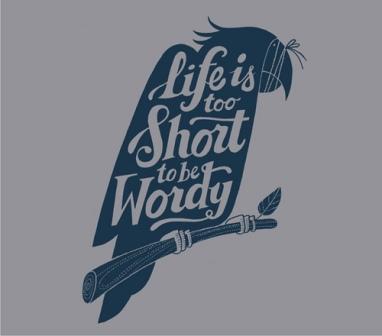 Everyone's making gleeful lists about how Kindle will liberate publishing. On one I read 'The death of literary fiction. No more dusty navel-gazing where a character stands in the middle of a room for 500 pages while bog-all happens. Good riddance.'
Everyone's making gleeful lists about how Kindle will liberate publishing. On one I read 'The death of literary fiction. No more dusty navel-gazing where a character stands in the middle of a room for 500 pages while bog-all happens. Good riddance.'
Although I think that's rather unkind to litfic, they do have a point. And among those who don't read it, it's a common view. Last night Dave and I had a friend around whose latest action-adventure novel will hit the shelves in a month. We were reading out passages from each other's books. He viewed mine with a wary eye. Not to blow my own trumpet, but pretty soon he said: 'hey, this is really good. I thought literary fiction was just writing with nothing going on'.
Very nice of you, I blushed.
And this is the problem. Some kinds of literary fiction have become so tangled in their own wordy knitting they've disengaged from story and sailed off into abstract conceptual realms, like the kind of paintings that look to most people like 17 bits of string and a battered transistor. Some literary readers look sniffily at plot and feel it sullies the purity of the artform. But that's not all of literature. Hemingway, Jane Austen, Graham Greene, Evelyn Waugh, Charles Dickens, Steinbeck and the Brontes wrote perceptively and deeply of the human condition but they explored it through page-turning stories that anyone could understand.
Which brings me to why I'm releasing My Memories of a Future Life as 4 novellas on Kindle. One reason is because the market says 0.99c is the ideal 'try-me' price. Another is because Kindle is suited to short form as well as long form. But most importantly it's because I hope to prove that literary fiction is as compelling as a Hitchcock movie, or an episode of Lost.
Thank you, busyPrinting, for the pic. My Memories of a Future Life launches on 30 August.








August 21, 2011
It took me years to write my first book. Does it get easier?
 Yes. And here's what you can do to help it along.
Yes. And here's what you can do to help it along.
Joanna Penn was writing this week about how she's smartened her writing routine as a result of what she learned while writing her first novel, Pentecost. I thought I'd share the ways in which I've found my own writing sped up from those early, stumbling days.
It's as if we write our first novel with a blindfold on. We have an idea for a story and off we go, grabbing things, finding they're not what we thought, discarding them, discovering holes. At some point we pay more attention to learning to write. By the time we roll out a manuscript that will please our most critical readers we've come a long way.
Obviously by novel two that learning curve is behind us. We know what a story needs, structurally and emotionally. We appreciate the needs of our genre. We've worked with editors or feedback groups and we understand how outsiders see our work.
Establish a method
As I'm sure you'll appreciate from reading this blog, writers who produce reliably establish a method for getting the work done. I put mine in Nail Your Novel and it seems to work rather well for a lot of people
All that is part of the craft. But there's the other half of the writing process as well – the creative one. That's harder to control because with ideas we tend to get what our inspiration gives us. To an extent, we still have the blindfolds on.
Make your muse work smarter
When you're arming yourself to tackle another novel, it helps to look at the way you handle creative problems. You will probably find you hit a number of blocks the first time round, and you can take more control of them now. With a bit of analysis, you can reduce periods where you're scratching your head because you don't know what's wrong or you have no ideas at all. In other words, you can fend off the dreaded block.
Ask yourself these questions
Where in the story did you waste time on things that didn't work? Were they a particular kind of scene?
How long did it take you to find out what engaged you about your story? Are there questions you could ask yourself to drill down to that more quickly so that you know where your story is going?
How could you have prepared better for writing each scene in close up?
What darlings did you keep on life support that you ended up killing anyway?
Where did you go around loops of a maze instead of taking a straight line?
Where were you lazy – and unmasked by your editors or crit partners?
Where did you contrive situations to get something in that wasn't going to fit?
Where did you get in a tangle with continuity and could you have made things easier for yourself?
What did your beta readers or editors identify as your weaknesses? What can you do to pre-empt those problems this time around?
What kind of research did you need to do and what was a waste of time?
Thank you, Mockstar on Flickr, for the picture. Have you ever diagnosed where your muse could have worked smarter? If you do it now, what would it tell you? Share in the comments!








August 20, 2011
My experiment in ESP… guest post at Kindle Authors UK
 I'm guesting today at Kindle Authors UK, a group of professional authors who are bringing out indie projects on the Kindle. We're from a wide sweep of genres, sometimes trying new pieces outside our established brand, sometimes republishing works that have fallen out of print, sometimes bringing out the novels that agents have battled for but found too difficult to place.
I'm guesting today at Kindle Authors UK, a group of professional authors who are bringing out indie projects on the Kindle. We're from a wide sweep of genres, sometimes trying new pieces outside our established brand, sometimes republishing works that have fallen out of print, sometimes bringing out the novels that agents have battled for but found too difficult to place.
This is such an exciting time in publishing and together we're hoping to raise the profile of indie authors and show everyone what we can do! Do hop over – and in the meantime I'm preparing a proper writing post for tomorrow.
My Memories of a Future Life: a novel in 4 novellas: first episode, 30 August








August 17, 2011
My Memories of a Future Life – the secret weapon
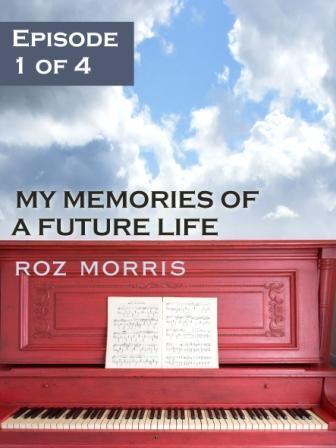 Everyone's talking about how publishing has broken all its rules this year. We've had agents publishing their authors' backlists as ebooks, or arguing about why they shouldn't. We've had agents lobbying for authors to get a much higher percentage of ebook rights. We've had authors tearing up their contracts and going indie – and some of them have become the infamous Kindle millionaires.
Everyone's talking about how publishing has broken all its rules this year. We've had agents publishing their authors' backlists as ebooks, or arguing about why they shouldn't. We've had agents lobbying for authors to get a much higher percentage of ebook rights. We've had authors tearing up their contracts and going indie – and some of them have become the infamous Kindle millionaires.
One idea I've heard whispered in these discussions is whether longform fiction should be serialised. Usually it's quickly dismissed. Oh no one's doing that.
Yes they are. I'm going to.
A short while ago I revealed in this post that I had a secret weapon for launching My Memories of a Future Life.
And this is it. I'm going to publish it in four hefty parts.
The entire novel is a scale-breaking 100,000 words, so each episode is roughly 25,000 – a good novella's worth of reading each time.
Yes, this is an experiment. It could be argued that it's a 150-year-old experiment as it's the same model used by another famous self-publisher – Charles Dickens.
It's either a great idea or monumentally dumb. But I'm already breaking rules by self-publishing a literary novel when most indie releases are genre, so why not stomp on another?
My agent tells me he's watching with great interest. Not just out of curiosity, but to see if this is a viable model for the agency's own ventures into new publishing models. So it's not just a small step for me…
How much will it be? The magic 99c per episode. If you're late getting to an episode, don't worry – once they're up in the Kindle store, they will be up for ever. Although you might have to block your ears to the chat on Twitter about it…
So that's my secret weapon. My Memories of a Future Life is a literary novel written to be released episodically, week by week, the way Dickens wrote his serialised novels. Starting Tuesday August 30th, then Mondays thereafter – September 5, September 12, and the final episode on September 19th.
Wish me luck. And just so I feel more emboldened, tell me what rules – writing or otherwise – you've broken this week.








August 16, 2011
What you need to know about cover design – self-published or not
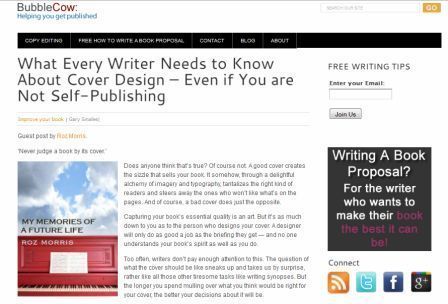 I'm guesting today at Bubblecow, the site for writers started by novelist Caroline Smailes. Bubblecow's site is a treasure trove of advice and information for writers of all stamps – both traditionally published and self-published, and they provide editorial services across the board to both individual authors and mainstream publishers.
I'm guesting today at Bubblecow, the site for writers started by novelist Caroline Smailes. Bubblecow's site is a treasure trove of advice and information for writers of all stamps – both traditionally published and self-published, and they provide editorial services across the board to both individual authors and mainstream publishers.
They asked me to write a post on covers. The outfit your book wears when it meets its public is make or break. It's one of the main ways readers will judge your book. Find out what you can do to give it the best chance you can.











